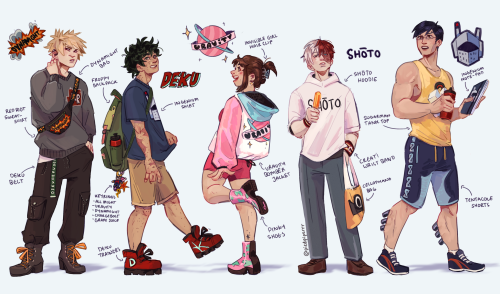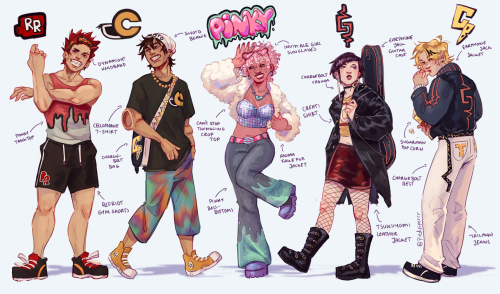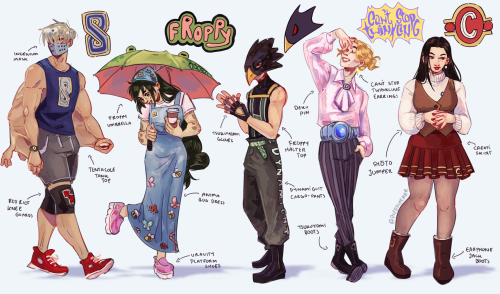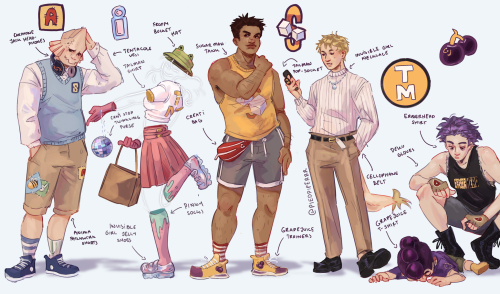Is It Just Me Or Was Endeavor's Arc Never About Him Deserving Redemption??? Nor Was He Ever Actually
is it just me or was endeavor's arc never about him deserving redemption??? nor was he ever actually redeemed? like, atonement vs redemption are two very different things, and watering him down to "he is a horrible person henceforth he does not deserve to be written a redemption arc." in my opinion, that's just a tragic waste of his character.
endeavour's existence as a hero actually brings a very important and nuanced layer to the world of MHA and also brings up the question; is a person's good deeds enough to measure their worth?
think about it: todoroki enji is an abusive father and husband. he bought his wife, participated in a genetics scheme, neglected two of his children, pushed his eldest to his limit psychologically, and physically abused his youngest.
but think of endeavour: the number two hero. his efficiency rates are the highest in the country. he keeps property damage to the absolute minimum and runs an agency with an expansive network of sidekicks. and what is this man's job? he SAVES LIVES. it is his literal JOB to SAVE PEOPLE, and he is THE BEST in his field. it would be one thing if he were incompetent, but endeavour is literally incredible at his job.
the dichotomy proposes a philosophical question: would you remove this man from his job when he is so instrumental to the protection of the population?
i understand how severe his abuse was. i understand how severe abuse IS. it ruins the very foundations of who you are. todoroki enji effectively has ruined his family. but he has something that many abusers do not have: guilt.
his guilt does not absolve him of his crimes. he is aware of this. but he is attempting to take accountability. and while he is entirely too late, would you rather have the man not try at all? and for the people who want him locked up: what is endeavour serving a prison sentence going to do for the population? sow growing fear and distrust in a society where people are losing faith in their heroes?
there's one more layer that people forget, or in some cases, refuses to acknowledge: he loves his family. he only comes to love them far too late. and thats another thing people forget: abusers can truly love the people they abuse. and enji loves his kids, you can see it in the way he embraces natsuo after he thought he almost died, how he embraced touya even if he thought he would die with him, how proud he is of shouto as a hero, and how thankful he is for fuyumi. he still remembers rei's favorite flowers and always has them sent for her. the problem is that it's all too late. too little, too late. but it's THERE and i find the writing incredible.
i just think that endeavour is such a brilliantly written character. not redeeming endeavour would've made him a cartoonishly evil character, and undermined the themes mha depicts. what makes a hero? what level of morality does someone need to have? if a man is a murderer, but ends up saving another in a heroic act, is he now a hero? redemption is never something people deserve. it is something they earn, and whether endeavour was truly redeemed was a personal decision, that only the people he abused could ever make.
the beautiful part of it all, was that every todoroki had a different response to it. because every single one of their responses were valid.
natsuo walked away and went no-contact. enji would never see his future daughter-in-law, or grandchild, or anyone from natsuo's family ever again. and that's something enji will forever have to live with.
rei stays by her husbands side. she chooses to forgive. if only because she feels guilty too.
fuyumi genuinely wants to reconnect her family, not just for enji's sake, but for her own. because she wants to cling to the only family she has.
shouto wants to establish his own identity away from his father, and become a hero in spite of what enji has done to him. because it's who he is.
and touya wants to burn it all down.
these are all very, very real responses to abuse and destructive family dynamics. and it was all beautifully written. keeping up with the todorokis is honestly some of the best family writing i've seen in shounen. its rare to have a full family written into the picture with such realistic and complex problems, that show their lives as a family not just from childhood, as almost all animes do, but how their dynamics shift and change as everyone in the family grows and moves on with their lives. families aren't just shed for narrative purposes like it's mostly written in manga and shounen. they stick with you almost your whole life. and endeavour is an important part of the tapestry created- "not redeeming" him is the same as throwing him out of the picture.
because endeavour is a realistic depiction of an abusive man. and i know from personal experience- abusers are not cartoonish monsters. they're real people with emotions like everybody else. and the harm they inflict on others always backfires on them- they'll feel it for the rest of their lives. and so does endeavour. he destroyed his own family, and he's not getting it back. he knows this. so he's not going to try and get all of them to love him again, he knows that would he pointless.
hence the atonement. he's going to be there from now on, however he can, because he knows that nothing he can ever do will fix his mistakes. he will never be at that dining table with his family.
anyway lol end of ramble i just think he's an amazing character and stories should explore more themes based around him and the todoroki family
More Posts from Nanazillastic and Others










batman: under the red hood (2010) + letterboxd reviews + (happy birthday jason todd <333)
like the first rule of cooking is to have fun and be yourself and the first rule of baking is to stay calm because the dough can sense fear
how i know lamb secretly views standish as his wife and river as their adopted orange cat son is that he makes it clear a thousand times that he fucking hates david cartwright and wouldn't mind if he died but david is important to river and lamb had to hear standish say, "river will never forgive me if something happens to him" so basically everything lamb does this series is because he can't let standish (his work wife) let river (his work son) down. LIKE.




Thee kiddos



Domhnall Gleeson (General Hux) in Star Wars: The Last Jedi (2017)
I do love that in Rohan culture, it seems that it's the custom for men to go out and fight and die heroically, and for women to honour their sacrifice by crying over their bodies or at their funerals. The men are to be brave, the woman to be loving. The men are to do great things. The women are to remember.
But in the film, whereas Eowyn's most iconic moment is her slaying of the Witch King, a great, heroic deed that cements her place in history, Eomer's most iconic moment is (arguably) his guttural scream when he sees Eowyn dead on the ground, dropping to his knees and cradling her to his chest.
Not only is Eowyn's most iconic moment a scene in which she takes on, by her culture's definition, the man's role, the most important role of a man, to die heroically, Eomer's most iconic moment is when he takes on the "woman's" role, to grieve.
I do love his "Death!" charge in the books so much, but because of this parallel between the siblings, I also love the film version where there is no battle for him to fight, no justice for him to wreak, there's nothing for him to do but cradle Eowyn to his chest and rock her back and forth.
randomly remembered river running up to a motorcyclist while running away from a mob with a dog, politely but urgently saying 'monsieur' (the boy knows manners!) because he needs the bike. but the french monsieur is too bewildered by the man in the chic coat so he doesn't move. so river, the ever impulsive spy boy, loses his patience and just says 'all right, fuck off' and forces the most french looking long-haired monsieur off the bike. only to then hilariously slowly (how apt!) escape the mob. success! wobbly, but success nevertheless lmao
-
 214311 liked this · 1 month ago
214311 liked this · 1 month ago -
 drrkives liked this · 1 month ago
drrkives liked this · 1 month ago -
 coolestzed liked this · 1 month ago
coolestzed liked this · 1 month ago -
 atinytiredlatina liked this · 1 month ago
atinytiredlatina liked this · 1 month ago -
 nanazillastic reblogged this · 1 month ago
nanazillastic reblogged this · 1 month ago -
 nanazillastic liked this · 1 month ago
nanazillastic liked this · 1 month ago -
 the-undead-eurydice liked this · 2 months ago
the-undead-eurydice liked this · 2 months ago -
 blitzbeetle liked this · 2 months ago
blitzbeetle liked this · 2 months ago -
 haiisx liked this · 2 months ago
haiisx liked this · 2 months ago -
 perksofbeingahalfie liked this · 2 months ago
perksofbeingahalfie liked this · 2 months ago -
 haboumbalakaka liked this · 2 months ago
haboumbalakaka liked this · 2 months ago -
 the-aerispace reblogged this · 2 months ago
the-aerispace reblogged this · 2 months ago -
 the-aerispace liked this · 2 months ago
the-aerispace liked this · 2 months ago -
 i-just-want-a-asian-boyfriend liked this · 2 months ago
i-just-want-a-asian-boyfriend liked this · 2 months ago -
 appledkiko liked this · 2 months ago
appledkiko liked this · 2 months ago -
 rurounivash liked this · 2 months ago
rurounivash liked this · 2 months ago -
 captainknackig reblogged this · 2 months ago
captainknackig reblogged this · 2 months ago -
 differentsweetspainter liked this · 2 months ago
differentsweetspainter liked this · 2 months ago -
 slothsmoths reblogged this · 2 months ago
slothsmoths reblogged this · 2 months ago -
 slothsmoths liked this · 2 months ago
slothsmoths liked this · 2 months ago -
 oven-doesthings liked this · 2 months ago
oven-doesthings liked this · 2 months ago -
 orionadrien liked this · 2 months ago
orionadrien liked this · 2 months ago -
 laarbybarbtbox reblogged this · 2 months ago
laarbybarbtbox reblogged this · 2 months ago -
 laarbybarbtbox reblogged this · 2 months ago
laarbybarbtbox reblogged this · 2 months ago -
 burntsora-deactivated20203 reblogged this · 2 months ago
burntsora-deactivated20203 reblogged this · 2 months ago -
 burntsora-deactivated20203 liked this · 2 months ago
burntsora-deactivated20203 liked this · 2 months ago -
 lakemetaphor liked this · 2 months ago
lakemetaphor liked this · 2 months ago -
 why123456889 liked this · 2 months ago
why123456889 liked this · 2 months ago -
 cabbagewhites reblogged this · 2 months ago
cabbagewhites reblogged this · 2 months ago -
 cabbagewhites liked this · 2 months ago
cabbagewhites liked this · 2 months ago -
 mediocreace liked this · 2 months ago
mediocreace liked this · 2 months ago -
 ghostlydisappointment liked this · 2 months ago
ghostlydisappointment liked this · 2 months ago -
 perpetual-enjine liked this · 2 months ago
perpetual-enjine liked this · 2 months ago -
 donthitanybody reblogged this · 2 months ago
donthitanybody reblogged this · 2 months ago -
 carcinoculler liked this · 2 months ago
carcinoculler liked this · 2 months ago -
 doubleabatteryies liked this · 2 months ago
doubleabatteryies liked this · 2 months ago -
 arinashoyo liked this · 2 months ago
arinashoyo liked this · 2 months ago -
 aikugo liked this · 2 months ago
aikugo liked this · 2 months ago -
 khaasi liked this · 2 months ago
khaasi liked this · 2 months ago -
 tianatuna liked this · 2 months ago
tianatuna liked this · 2 months ago -
 katsdynam1ght reblogged this · 2 months ago
katsdynam1ght reblogged this · 2 months ago -
 revilloutionaire reblogged this · 2 months ago
revilloutionaire reblogged this · 2 months ago -
 katsdynam1ght reblogged this · 2 months ago
katsdynam1ght reblogged this · 2 months ago -
 milktemproom liked this · 2 months ago
milktemproom liked this · 2 months ago -
 greenhappyseed liked this · 2 months ago
greenhappyseed liked this · 2 months ago -
 smashley351 reblogged this · 2 months ago
smashley351 reblogged this · 2 months ago -
 bfire92 reblogged this · 2 months ago
bfire92 reblogged this · 2 months ago


